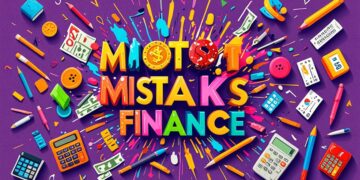
Most Common Mistakes in Personal Finance and How to Avoid Them
Managing personal finances can be challenging, with common mistakes like overspending, neglecting savings, and ignoring retirement plans often leading to financial instability. By recognizing these pitfalls and implementing budgeting strategies, seeking professional advice, and prioritizing financial literacy, individuals can build a secure and prosperous financial future.

The Revolution of Tech Company Stocks: How to Invest in Successful Startups
Explore the dynamic world of tech company stocks and learn how to invest in successful startups. Discover innovative solutions, growth potential, and key market trends while developing a discerning investment strategy. With informed choices, you can contribute to groundbreaking advancements and capitalize on the tech revolution's immense opportunities.

How Technology Is Transforming the Financial Sector (Fintechs)
Technological innovations are reshaping the financial sector by enhancing accessibility, efficiency, and personalization. Fintech companies are streamlining services through mobile payments, online banking, and investment platforms, while also improving security and fostering financial inclusion. The results are a more dynamic and user-friendly financial landscape for all.

Market Analysis: Investment Trends in Emerging Sectors in the US
This article explores investment trends in emerging sectors in the US, highlighting opportunities in renewable energy, health tech, artificial intelligence, cybersecurity, and digital finance. It emphasizes aligning investments with sustainability and innovation, encouraging informed financial decisions that reflect personal values and promote societal well-being.

Analysis of the impact of interest rates on investment portfolios
This article explores the impact of interest rates on investment portfolios, detailing how rate fluctuations influence stock market performance, bond prices, and real estate investments. It emphasizes the importance of understanding these dynamics for informed decision-making, risk management, and successful investment strategies in a changing financial landscape.

Diversification Strategies for Beginner Investors
Discover essential diversification strategies for beginner investors to build a resilient portfolio. By spreading investments across various asset classes, sectors, and geographies, you can manage risks while enhancing growth potential. Embrace methods like dollar-cost averaging and invest in educational resources to empower your financial future.

Sustainable Investments: How to Allocate Resources in Responsible Companies
Explore the transformative potential of sustainable investments, which align your financial goals with responsible companies. By strategically allocating resources toward environmentally and socially conscious businesses, you can foster positive change while building wealth. Embrace impactful strategies to create a portfolio that promotes sustainability and ethical practices for a brighter future.

Real Estate Investments: Opportunities and Challenges in the American Market
Real estate investments present lucrative opportunities and significant challenges in the American market. Understanding market dynamics, exploring diverse property options, and leveraging tax benefits can enhance profitability. However, investors must navigate market volatility and financing hurdles while prioritizing education and strategic planning for long-term financial success.

The impact of inflation on long-term investments
Inflation significantly influences long-term investments by eroding purchasing power, reshaping interest rates, and impacting asset allocation. Understanding its effects empowers investors to make informed decisions, diversify portfolios, and adopt strategies like dollar-cost averaging to safeguard against inflation, ensuring financial resilience and growth amidst economic fluctuations.

The role of technology in the future of investments: fintechs and automated investments
The rise of fintech and automated investment solutions is revolutionizing the financial landscape, enhancing accessibility and affordability for investors. These technologies empower individuals with personalized strategies and ethical investing options, fostering informed financial decisions that align with personal values and contribute to a sustainable future.